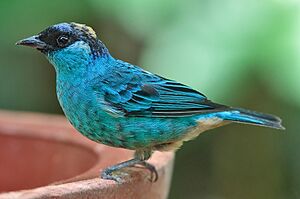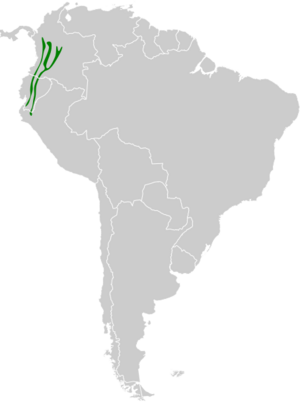Golden-naped tanager facts for kids
Quick facts for kids Golden-naped tanager |
|
|---|---|
 |
|
| Conservation status | |
| Scientific classification |
|
| Kingdom: | Animalia |
| Phylum: | Chordata |
| Class: | Aves |
| Order: | Passeriformes |
| Family: | Thraupidae |
| Genus: | Chalcothraupis Bonaparte, 1851 |
| Species: |
C. ruficervix
|
| Binomial name | |
| Chalcothraupis ruficervix (Prévost & des Murs, 1842)
|
|
 |
|
| Script error: The function "autoWithCaption" does not exist. | |
| Synonyms | |
|
|
Script error: No such module "Check for conflicting parameters".
The golden-naped tanager (Chalcothraupis ruficervix) is a beautiful bird from the tanager family, called Thraupidae. You can find these colorful birds in South America, living in countries like Colombia, Ecuador, Peru, and Bolivia. They prefer to live in moist mountain forests, but they can also be found in areas where forests have been changed by people.
Contents
About Its Name
Scientists give special names to all living things, and the golden-naped tanager got its first name from two French naturalists, Florent Prévost and Marc Athanase Parfait Œillet Des Murs, way back in 1842. They called it Tanagra ruficervix. The "ruficervix" part of its name comes from Latin words: rufus means "red," and cervix means "nape" (the back of the neck). So, its name describes the reddish patch on its neck!
Later, in 2014, scientists studied the birds' DNA more closely. They found that some birds in the Tangara group needed to be moved to a different group to make sure all the birds in a group were closely related. So, the golden-naped tanager moved to a group called Chalcothraupis. This group name was actually first used by a French naturalist named Charles Lucien Bonaparte in 1851. The name Chalcothraupis comes from ancient Greek words: khalkos means "bronze," and thraupis was a name for a small bird.
Different Types of Golden-Naped Tanagers
Just like people can have different looks depending on where they are from, birds can have different types too, called subspecies. There are six known subspecies of the golden-naped tanager:
- C. r. ruficervix (Prévost & Des Murs, 1842) – Found in Colombia.
- C. r. leucotis (Sclater, PL, 1851) – Found in western Ecuador.
- C. r. taylori (Taczanowski & Berlepsch, 1885) – Found in southeastern Colombia, eastern Ecuador, and northern Peru.
- C. r. amabilis (Zimmer, JT, 1943) – Found from northern to central Peru.
- C. r. inca (Parkes, 1969) – Found in southern Peru.
- C. r. fulvicervix (Sclater, PL & Salvin, 1876) – Found in southeastern Peru and western Bolivia.
What Does It Look Like?
The golden-naped tanager is a very striking bird! Most of its body is a beautiful blue color. It also has a black mask on its face, which makes it look quite mysterious.
What makes this bird special is the bright golden or reddish patch on the back of its neck, called the nape. This patch is why it's called "golden-naped"! While other tanagers might be blue with black faces, the golden-naped tanager is the only one with this unique golden or reddish patch.
Males, Females, and Young Birds
- Adult Males: Have the bright blue body, black face mask, and a clear golden or reddish patch on their nape.
- Adult Females: Look similar to the males, but their colors are a bit duller. Their nape patch is also not as wide or bright.
- Young Birds (Juveniles): Both young males and females look different from the adults. They are mostly a dull blue-gray color. Their chest and belly are lighter, and they don't have that special golden nape patch yet. They get their bright colors as they grow up!
 | Emma Amos |
 | Edward Mitchell Bannister |
 | Larry D. Alexander |
 | Ernie Barnes |


